2024年中考英语仁爱版一轮复习教材梳理 学案 课时11 八年级Unit 3(含答案)
文档属性
| 名称 | 2024年中考英语仁爱版一轮复习教材梳理 学案 课时11 八年级Unit 3(含答案) |
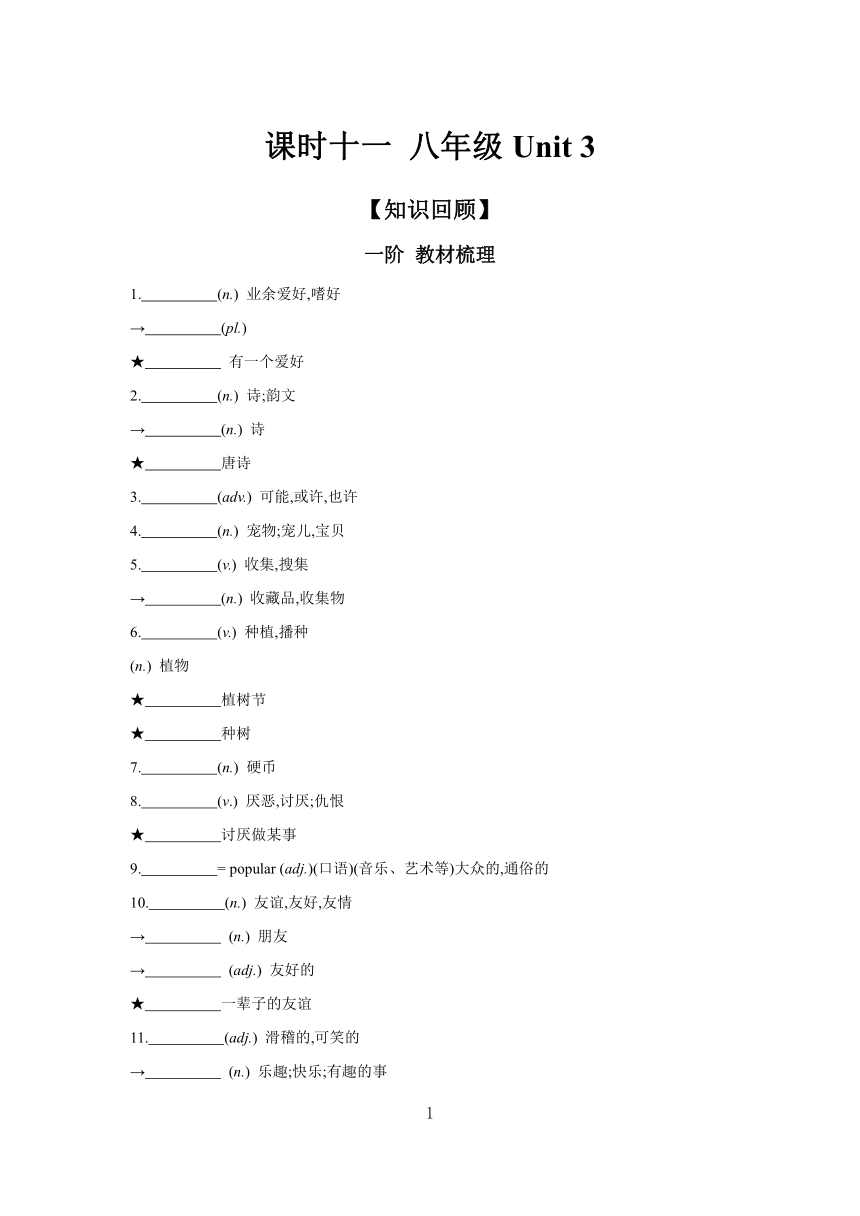
|
|
| 格式 | docx | ||
| 文件大小 | 204.8KB | ||
| 资源类型 | 教案 | ||
| 版本资源 | 仁爱科普版 | ||
| 科目 | 英语 | ||
| 更新时间 | 2024-03-08 16:21:15 | ||
图片预览

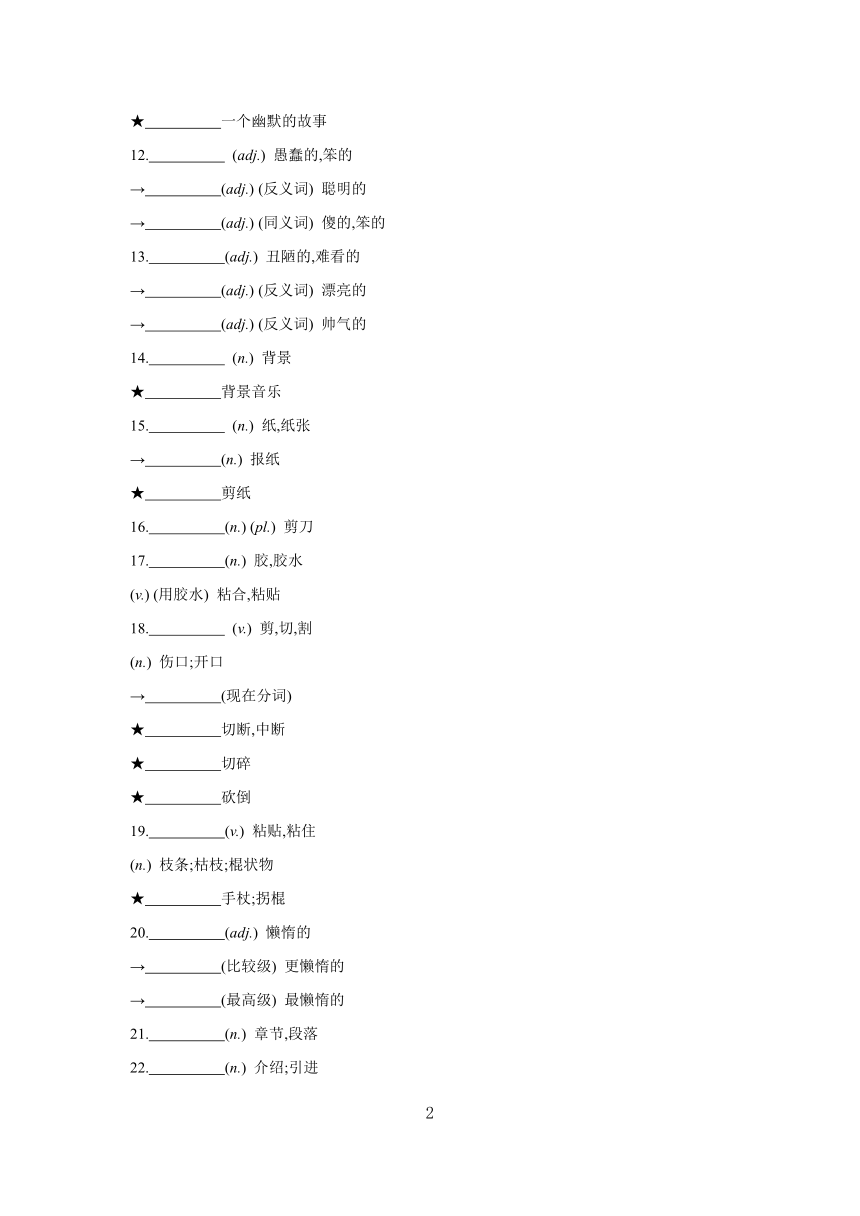
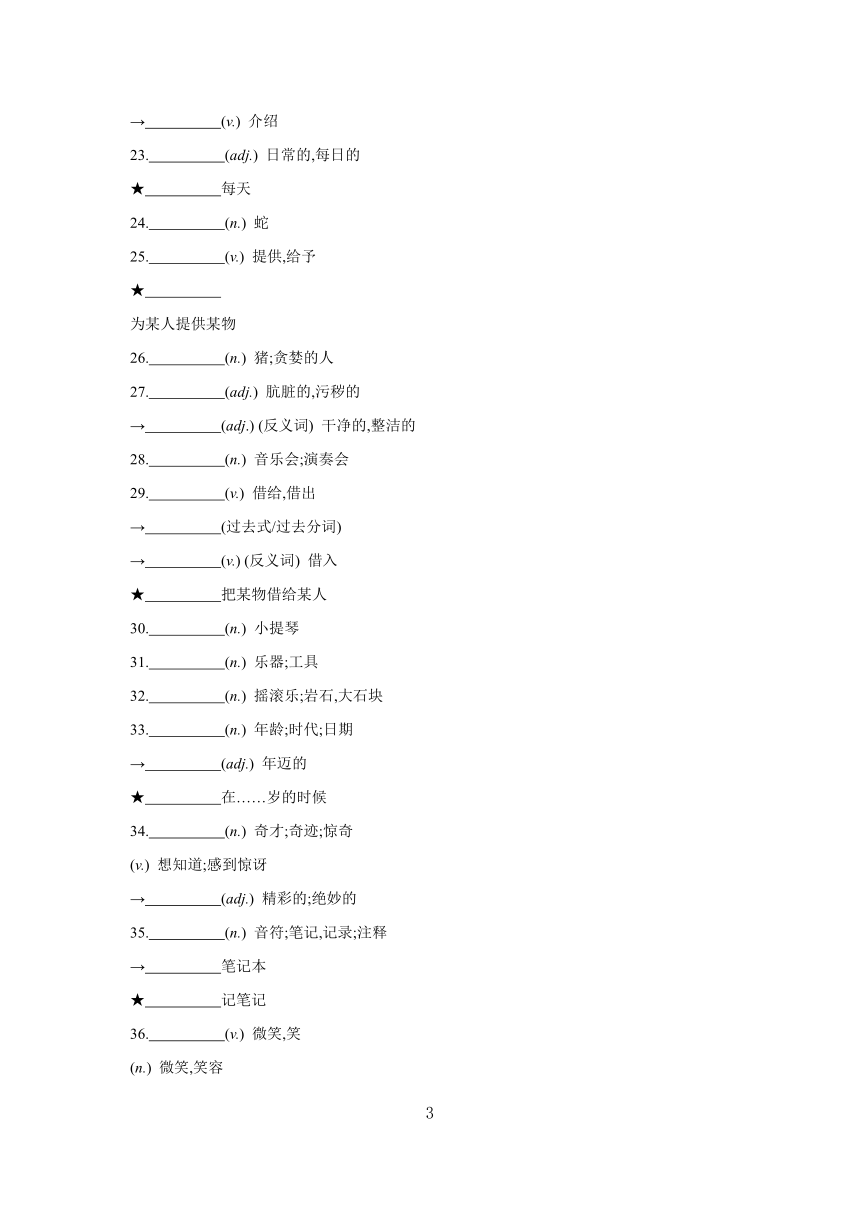
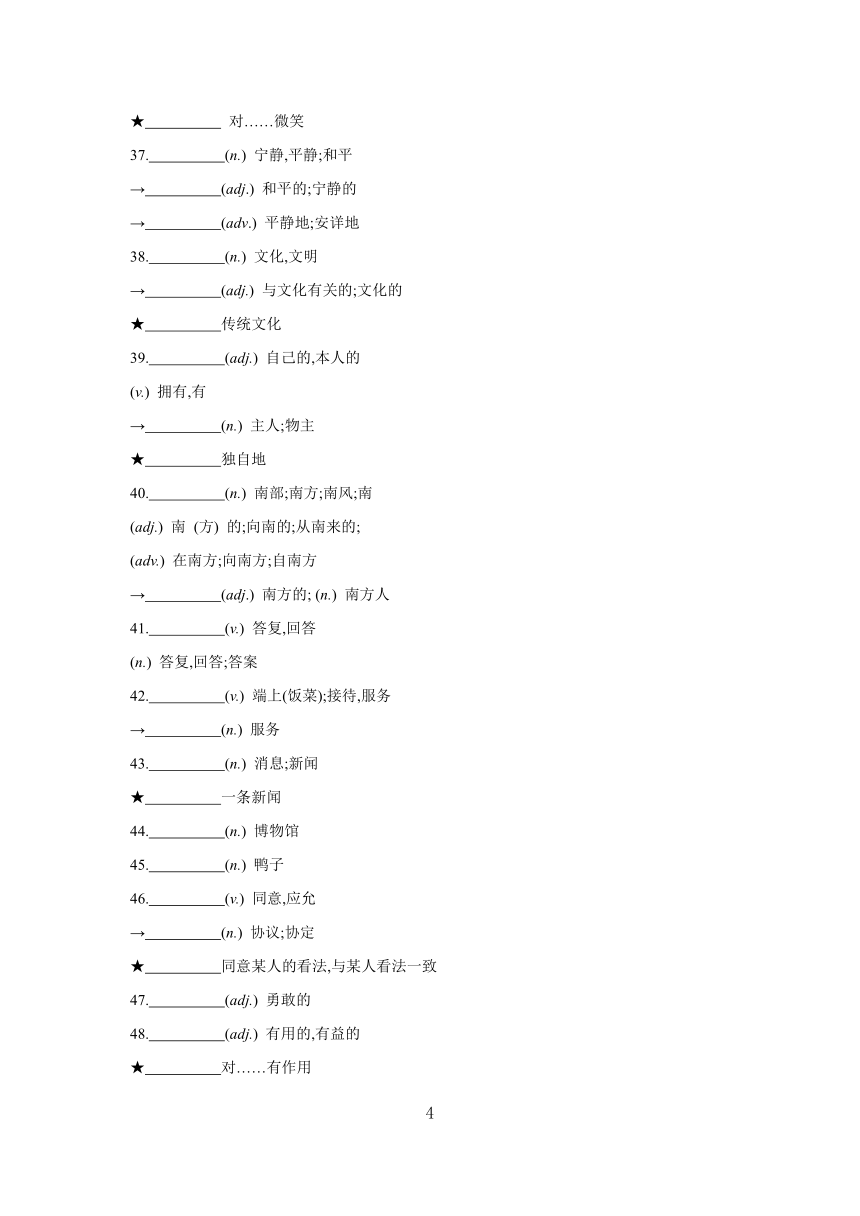
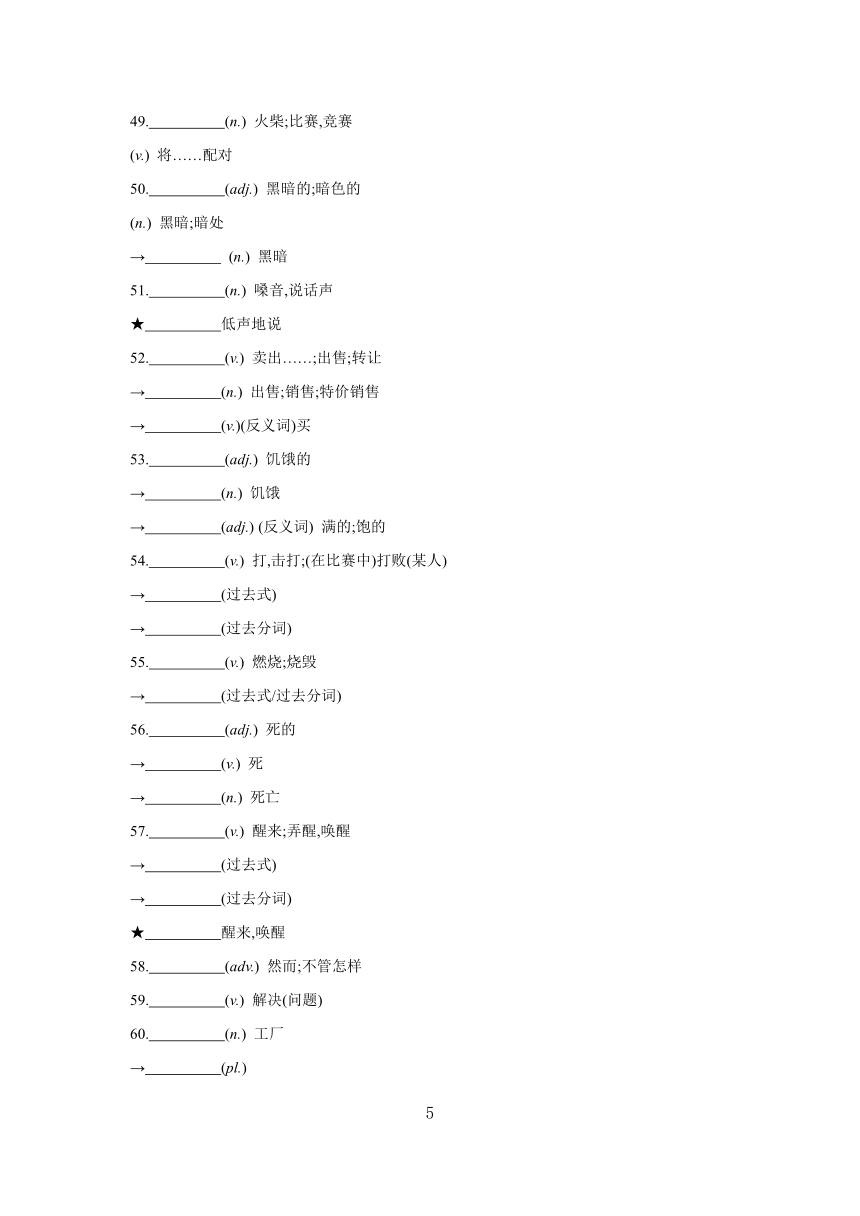
文档简介
课时十一 八年级Unit 3
【知识回顾】
一阶 教材梳理
1. (n.) 业余爱好,嗜好
→ (pl.)
★ 有一个爱好
2. (n.) 诗;韵文
→ (n.) 诗
★ 唐诗
3. (adv.) 可能,或许,也许
4. (n.) 宠物;宠儿,宝贝
5. (v.) 收集,搜集
→ (n.) 收藏品,收集物
6. (v.) 种植,播种
(n.) 植物
★ 植树节
★ 种树
7. (n.) 硬币
8. (v.) 厌恶,讨厌;仇恨
★ 讨厌做某事
9. = popular (adj.)(口语)(音乐、艺术等)大众的,通俗的
10. (n.) 友谊,友好,友情
→ (n.) 朋友
→ (adj.) 友好的
★ 一辈子的友谊
11. (adj.) 滑稽的,可笑的
→ (n.) 乐趣;快乐;有趣的事
★ 一个幽默的故事
12. (adj.) 愚蠢的,笨的
→ (adj.) (反义词) 聪明的
→ (adj.) (同义词) 傻的,笨的
13. (adj.) 丑陋的,难看的
→ (adj.) (反义词) 漂亮的
→ (adj.) (反义词) 帅气的
14. (n.) 背景
★ 背景音乐
15. (n.) 纸,纸张
→ (n.) 报纸
★ 剪纸
16. (n.) (pl.) 剪刀
17. (n.) 胶,胶水
(v.) (用胶水) 粘合,粘贴
18. (v.) 剪,切,割
(n.) 伤口;开口
→ (现在分词)
★ 切断,中断
★ 切碎
★ 砍倒
19. (v.) 粘贴,粘住
(n.) 枝条;枯枝;棍状物
★ 手杖;拐棍
20. (adj.) 懒惰的
→ (比较级) 更懒惰的
→ (最高级) 最懒惰的
21. (n.) 章节,段落
22. (n.) 介绍;引进
→ (v.) 介绍
23. (adj.) 日常的,每日的
★ 每天
24. (n.) 蛇
25. (v.) 提供,给予
★
为某人提供某物
26. (n.) 猪;贪婪的人
27. (adj.) 肮脏的,污秽的
→ (adj.) (反义词) 干净的,整洁的
28. (n.) 音乐会;演奏会
29. (v.) 借给,借出
→ (过去式/过去分词)
→ (v.) (反义词) 借入
★ 把某物借给某人
30. (n.) 小提琴
31. (n.) 乐器;工具
32. (n.) 摇滚乐;岩石,大石块
33. (n.) 年龄;时代;日期
→ (adj.) 年迈的
★ 在……岁的时候
34. (n.) 奇才;奇迹;惊奇
(v.) 想知道;感到惊讶
→ (adj.) 精彩的;绝妙的
35. (n.) 音符;笔记,记录;注释
→ 笔记本
★ 记笔记
36. (v.) 微笑,笑
(n.) 微笑,笑容
★ 对……微笑
37. (n.) 宁静,平静;和平
→ (adj.) 和平的;宁静的
→ (adv.) 平静地;安详地
38. (n.) 文化,文明
→ (adj.) 与文化有关的;文化的
★ 传统文化
39. (adj.) 自己的,本人的
(v.) 拥有,有
→ (n.) 主人;物主
★ 独自地
40. (n.) 南部;南方;南风;南
(adj.) 南 (方) 的;向南的;从南来的;
(adv.) 在南方;向南方;自南方
→ (adj.) 南方的; (n.) 南方人
41. (v.) 答复,回答
(n.) 答复,回答;答案
42. (v.) 端上(饭菜);接待,服务
→ (n.) 服务
43. (n.) 消息;新闻
★ 一条新闻
44. (n.) 博物馆
45. (n.) 鸭子
46. (v.) 同意,应允
→ (n.) 协议;协定
★ 同意某人的看法,与某人看法一致
47. (adj.) 勇敢的
48. (adj.) 有用的,有益的
★ 对……有作用
49. (n.) 火柴;比赛,竞赛
(v.) 将……配对
50. (adj.) 黑暗的;暗色的
(n.) 黑暗;暗处
→ (n.) 黑暗
51. (n.) 嗓音,说话声
★ 低声地说
52. (v.) 卖出……;出售;转让
→ (n.) 出售;销售;特价销售
→ (v.)(反义词)买
53. (adj.) 饥饿的
→ (n.) 饥饿
→ (adj.) (反义词) 满的;饱的
54. (v.) 打,击打;(在比赛中)打败(某人)
→ (过去式)
→ (过去分词)
55. (v.) 燃烧;烧毁
→ (过去式/过去分词)
56. (adj.) 死的
→ (v.) 死
→ (n.) 死亡
57. (v.) 醒来;弄醒,唤醒
→ (过去式)
→ (过去分词)
★ 醒来,唤醒
58. (adv.) 然而;不管怎样
59. (v.) 解决(问题)
60. (n.) 工厂
→ (pl.)
61. (n.) 湖,湖泊
62. (v.&n.) 笑,大笑;发笑
★ 嘲笑;因……而发笑
重点词块&句式
1. (为什么不) go out and do some outdoor activities
2.I (过去常常) collect baseball cards.
3. (什么爱好) do you have
4. (真可惜)!
5. (多么悦耳的音乐啊)!
6. (这很难说).
7.Pop music often (来得快去得也快).
8.They are very (受……欢迎) young people.
9. (别挂电话), please.
10. (你在干什么) at this time last night
【参考答案】
1.hobby hobbies have a hobby 2.poem poetry Tang Poetry 3.maybe 4.pet 5.collect collection
6.plant Tree Planting Day plant trees 7.coin 8.hate
hate to do/doing sth. 9.pop 10.friendship friend friendly a lifelong friendship 11.funny fun a funny story 12.stupid clever foolish 13.ugly beautiful handsome 14.background background music 15.paper
newspaper paper cutting 16.scissors 17.glue 18.cut
cutting cut off cut up cut down 19.stick walking stick
20.lazy lazier laziest 21.passage 22.introduction introduce 23.everyday every day 24.snake 25.provide provide sb. with sth.=provide sth. for sb. 26.pig 27.dirty clean 28.concert 29.lend lent borrow lend sth. to sb. 30.violin 31.instrument 32.rock 33.age aged at the age of... 34.wonder wonderful 35.note notebook make/take notes 36.smile smile at... 37.peace peaceful peacefully 38.culture cultural traditional culture 39.own owner
on one's own 40.south southern 41.answer 42.serve
service 43.news a piece of news 44.museum 45.duck
46.agree agreement agree with sb. 47.brave 48.useful be useful for/to... 49.match 50.dark darkness 51.voice in a low voice 52.sell sale buy 53.hungry hunger full 54.beat beat beat/beaten 55.burn burnt/burned 56.dead die death 57.wake
woke/waked woken/waked/woke wake up 58.however 59.solve 60.factory factories 61.lake 62.laugh laugh at...
重点词块&句式
1.Why not 2.used to 3.What hobbies 4.What a pity 5.What sweet music 6.It's hard to say 7.comes and goes quickly 8.popular with 9.Hold the line 10.What were you doing
二阶 语境巧记
1.He donated his whole (collect) of books to the library.
2.Lin Tao is very humorous and he always tells (fun) stories to make people laugh.
3.Thank you for the (introduce) of this new mobile phone. I like it a lot.
4.In the (south) part of China, people mainly feed on rice.
5.Failure isn't always bad. It can teach you some (use) lessons.
6.Sorry, sir. The wine you want has been (sell) out.
【参考答案】1.collection 2.funny 3.introduction 4.southern
5.useful 6.sold
三阶 语篇串记
sound they go right concert everywhere wait spend bird special
To me, music is food and water. I know this isn't 1. for everyone. Usually lots of people go to 2. or listen to music records. Maybe some of you don't do these, but music is 3. in our life. For example, when you watch movies or TV plays, you will find 4. boring if there's no music. And when you're 5. for the train or the plane, some music can make the time short.
Some people like to listen to the 6. of the sea. Some enjoy listening to the voices of 7. . Those sounds are some kind of music. Music has meaning for everyone. Of course, it has 8. meaning for people like me. We 9. most of our time playing or writing music.
Someone said, “Through music a child 10. into a world of beauty, learns to take care of others and makes his mind and body healthy.”
【参考答案】1.right 2.concerts 3.everywhere 4.them 5.waiting
6.sound 7.birds 8.special 9.spend 10.goes
【三核过考点】
【考点1】wonder 的用法
一看全国视野(探考向)
(2023·四川眉山改编)
—Look, here is a Harry Potter. I'm (wonder) whose book it is.
—It must be Mary's. J. K. Rowling is her favorite writer.
二理知识锦囊(累知识)
wonder可作名词或动词,主要用法如下:
一言辨异
I wonder how many wonders like the Great Wall there are in the world. 我想知道在世界上有多少像长城这样的奇观。
三测多维评价(练用法)
一句多译。
难怪他昨天赢得了比赛。他已经准备了好几个月。
1. (用It's no wonder that...)
2. (用No wonder that...)
【参考答案】一看:wondering
三测:1.It's no wonder that he won the match yesterday. He has prepared for it for months. 2.No wonder that he won the match yesterday. He has prepared for it for months.
【考点2】辨析used to do sth.、be/get/become used to doing sth. 与be used to do sth.
一看全国视野(探考向)
(2023·四川达州改编)The teachers used to (write) key points on the blackboard, but now they are getting used to (show) them through PPTs.
二理知识锦囊(累知识)
考点 含义及用法
used to do sth. 意为“过去常常做某事”,只用于过去时态
be/get used to doing sth. 意为“习惯做某事”,可用于多种时态
be used to do sth./for doing sth. “被用于做某事”,表示目的,可用于多种时态
三测多维评价(练用法)
用括号内所给单词的正确形式填空。
1.The old lady used to (dance) in the park.
2.Dick used to (eat) western food, but he is used to (eat) Chinese food now.
3.My elder brother is used to (sleep) with the window open.
4.Wood can be used to (make) paper and coal is used for (cook) meals.
【参考答案】一看:write showing
三测:1.dance 2.eat eating 3.sleeping 4.make cooking
【考点3】agree的用法
一看全国视野(探考向)
(2023·四川广安)Last month, my best friend to go to Zibo with me to taste its delicious food.(同意)
二理知识锦囊(累知识)
三测多维评价(练用法)
按要求完成句子。
1.When Tom asked me if my father agreed spend the holiday in the north, I said that he agreed my idea. So we agreed a date for it.(用恰当的介词填空)
2.After a heated discussion, they arrived at an (agree).(用所给词的适当形式填空)
3.He agrees to our plan.(改为同义句)
He is our plan.
【参考答案】一看:agreed
三测:1.to to on 2.agreement 3. in agreement with
【考点4】“也许”都不同
一看全国视野(探考向)
(2023·四川达州改编)We (may/maybe) meet many challenges in our lives. When we fail, we shouldn't lose courage and confidence.
二理知识锦囊(累知识)
may maybe may be
词义 可能 可能; 也许 可能是
词性 情态动词 副词 “情态动词+系动词”,作谓语
位置 在陈述句中, 放在主语后面, 动词原形前面 常位于句首, 作状语 may是情态动词, be是系动词, 与主语构成系表结构
三测多维评价(练用法)
根据要求完成下列句子。
1.Maybe he is at home now. (改为同义句)
He at home now.
2.也许我应该向Joe道歉。(翻译)
I should say sorry to Joe.
3.——你认为他会回来吗
——可能吧。(翻译)
—Do you think he'll come back
— .
【参考答案】一看:may
三测:1.may be 2.Maybe 3.Maybe
【考点5】fun的用法
一看全国视野(探考向)
(2023·江西改编)
—As I know, your friend Jeff is very humorous.
—Yes. He is (fun) person I know.
二理知识锦囊(累知识)
三测多维评价(练用法)
按要求完成下列练习。
1.Music is (fun; useless) and valuable for children.(选词填空)
2.Don't be shy! People will not laugh at you.(改为同义句)
Don't be shy! People will not you.
3.人们应该参加运动,因为它们不仅可以娱乐身心而且有益于健康。(根据汉语意思完成句子)
People should take part in sports, as they are not only but also for health.
4.我们应该去度假放松娱乐一下。(根据汉语意思完成句子)
We should go for a holiday to relax and .
【参考答案】一看:the funniest
三测:1.fun 2.make fun of 3.for fun 4.have fun
2
【知识回顾】
一阶 教材梳理
1. (n.) 业余爱好,嗜好
→ (pl.)
★ 有一个爱好
2. (n.) 诗;韵文
→ (n.) 诗
★ 唐诗
3. (adv.) 可能,或许,也许
4. (n.) 宠物;宠儿,宝贝
5. (v.) 收集,搜集
→ (n.) 收藏品,收集物
6. (v.) 种植,播种
(n.) 植物
★ 植树节
★ 种树
7. (n.) 硬币
8. (v.) 厌恶,讨厌;仇恨
★ 讨厌做某事
9. = popular (adj.)(口语)(音乐、艺术等)大众的,通俗的
10. (n.) 友谊,友好,友情
→ (n.) 朋友
→ (adj.) 友好的
★ 一辈子的友谊
11. (adj.) 滑稽的,可笑的
→ (n.) 乐趣;快乐;有趣的事
★ 一个幽默的故事
12. (adj.) 愚蠢的,笨的
→ (adj.) (反义词) 聪明的
→ (adj.) (同义词) 傻的,笨的
13. (adj.) 丑陋的,难看的
→ (adj.) (反义词) 漂亮的
→ (adj.) (反义词) 帅气的
14. (n.) 背景
★ 背景音乐
15. (n.) 纸,纸张
→ (n.) 报纸
★ 剪纸
16. (n.) (pl.) 剪刀
17. (n.) 胶,胶水
(v.) (用胶水) 粘合,粘贴
18. (v.) 剪,切,割
(n.) 伤口;开口
→ (现在分词)
★ 切断,中断
★ 切碎
★ 砍倒
19. (v.) 粘贴,粘住
(n.) 枝条;枯枝;棍状物
★ 手杖;拐棍
20. (adj.) 懒惰的
→ (比较级) 更懒惰的
→ (最高级) 最懒惰的
21. (n.) 章节,段落
22. (n.) 介绍;引进
→ (v.) 介绍
23. (adj.) 日常的,每日的
★ 每天
24. (n.) 蛇
25. (v.) 提供,给予
★
为某人提供某物
26. (n.) 猪;贪婪的人
27. (adj.) 肮脏的,污秽的
→ (adj.) (反义词) 干净的,整洁的
28. (n.) 音乐会;演奏会
29. (v.) 借给,借出
→ (过去式/过去分词)
→ (v.) (反义词) 借入
★ 把某物借给某人
30. (n.) 小提琴
31. (n.) 乐器;工具
32. (n.) 摇滚乐;岩石,大石块
33. (n.) 年龄;时代;日期
→ (adj.) 年迈的
★ 在……岁的时候
34. (n.) 奇才;奇迹;惊奇
(v.) 想知道;感到惊讶
→ (adj.) 精彩的;绝妙的
35. (n.) 音符;笔记,记录;注释
→ 笔记本
★ 记笔记
36. (v.) 微笑,笑
(n.) 微笑,笑容
★ 对……微笑
37. (n.) 宁静,平静;和平
→ (adj.) 和平的;宁静的
→ (adv.) 平静地;安详地
38. (n.) 文化,文明
→ (adj.) 与文化有关的;文化的
★ 传统文化
39. (adj.) 自己的,本人的
(v.) 拥有,有
→ (n.) 主人;物主
★ 独自地
40. (n.) 南部;南方;南风;南
(adj.) 南 (方) 的;向南的;从南来的;
(adv.) 在南方;向南方;自南方
→ (adj.) 南方的; (n.) 南方人
41. (v.) 答复,回答
(n.) 答复,回答;答案
42. (v.) 端上(饭菜);接待,服务
→ (n.) 服务
43. (n.) 消息;新闻
★ 一条新闻
44. (n.) 博物馆
45. (n.) 鸭子
46. (v.) 同意,应允
→ (n.) 协议;协定
★ 同意某人的看法,与某人看法一致
47. (adj.) 勇敢的
48. (adj.) 有用的,有益的
★ 对……有作用
49. (n.) 火柴;比赛,竞赛
(v.) 将……配对
50. (adj.) 黑暗的;暗色的
(n.) 黑暗;暗处
→ (n.) 黑暗
51. (n.) 嗓音,说话声
★ 低声地说
52. (v.) 卖出……;出售;转让
→ (n.) 出售;销售;特价销售
→ (v.)(反义词)买
53. (adj.) 饥饿的
→ (n.) 饥饿
→ (adj.) (反义词) 满的;饱的
54. (v.) 打,击打;(在比赛中)打败(某人)
→ (过去式)
→ (过去分词)
55. (v.) 燃烧;烧毁
→ (过去式/过去分词)
56. (adj.) 死的
→ (v.) 死
→ (n.) 死亡
57. (v.) 醒来;弄醒,唤醒
→ (过去式)
→ (过去分词)
★ 醒来,唤醒
58. (adv.) 然而;不管怎样
59. (v.) 解决(问题)
60. (n.) 工厂
→ (pl.)
61. (n.) 湖,湖泊
62. (v.&n.) 笑,大笑;发笑
★ 嘲笑;因……而发笑
重点词块&句式
1. (为什么不) go out and do some outdoor activities
2.I (过去常常) collect baseball cards.
3. (什么爱好) do you have
4. (真可惜)!
5. (多么悦耳的音乐啊)!
6. (这很难说).
7.Pop music often (来得快去得也快).
8.They are very (受……欢迎) young people.
9. (别挂电话), please.
10. (你在干什么) at this time last night
【参考答案】
1.hobby hobbies have a hobby 2.poem poetry Tang Poetry 3.maybe 4.pet 5.collect collection
6.plant Tree Planting Day plant trees 7.coin 8.hate
hate to do/doing sth. 9.pop 10.friendship friend friendly a lifelong friendship 11.funny fun a funny story 12.stupid clever foolish 13.ugly beautiful handsome 14.background background music 15.paper
newspaper paper cutting 16.scissors 17.glue 18.cut
cutting cut off cut up cut down 19.stick walking stick
20.lazy lazier laziest 21.passage 22.introduction introduce 23.everyday every day 24.snake 25.provide provide sb. with sth.=provide sth. for sb. 26.pig 27.dirty clean 28.concert 29.lend lent borrow lend sth. to sb. 30.violin 31.instrument 32.rock 33.age aged at the age of... 34.wonder wonderful 35.note notebook make/take notes 36.smile smile at... 37.peace peaceful peacefully 38.culture cultural traditional culture 39.own owner
on one's own 40.south southern 41.answer 42.serve
service 43.news a piece of news 44.museum 45.duck
46.agree agreement agree with sb. 47.brave 48.useful be useful for/to... 49.match 50.dark darkness 51.voice in a low voice 52.sell sale buy 53.hungry hunger full 54.beat beat beat/beaten 55.burn burnt/burned 56.dead die death 57.wake
woke/waked woken/waked/woke wake up 58.however 59.solve 60.factory factories 61.lake 62.laugh laugh at...
重点词块&句式
1.Why not 2.used to 3.What hobbies 4.What a pity 5.What sweet music 6.It's hard to say 7.comes and goes quickly 8.popular with 9.Hold the line 10.What were you doing
二阶 语境巧记
1.He donated his whole (collect) of books to the library.
2.Lin Tao is very humorous and he always tells (fun) stories to make people laugh.
3.Thank you for the (introduce) of this new mobile phone. I like it a lot.
4.In the (south) part of China, people mainly feed on rice.
5.Failure isn't always bad. It can teach you some (use) lessons.
6.Sorry, sir. The wine you want has been (sell) out.
【参考答案】1.collection 2.funny 3.introduction 4.southern
5.useful 6.sold
三阶 语篇串记
sound they go right concert everywhere wait spend bird special
To me, music is food and water. I know this isn't 1. for everyone. Usually lots of people go to 2. or listen to music records. Maybe some of you don't do these, but music is 3. in our life. For example, when you watch movies or TV plays, you will find 4. boring if there's no music. And when you're 5. for the train or the plane, some music can make the time short.
Some people like to listen to the 6. of the sea. Some enjoy listening to the voices of 7. . Those sounds are some kind of music. Music has meaning for everyone. Of course, it has 8. meaning for people like me. We 9. most of our time playing or writing music.
Someone said, “Through music a child 10. into a world of beauty, learns to take care of others and makes his mind and body healthy.”
【参考答案】1.right 2.concerts 3.everywhere 4.them 5.waiting
6.sound 7.birds 8.special 9.spend 10.goes
【三核过考点】
【考点1】wonder 的用法
一看全国视野(探考向)
(2023·四川眉山改编)
—Look, here is a Harry Potter. I'm (wonder) whose book it is.
—It must be Mary's. J. K. Rowling is her favorite writer.
二理知识锦囊(累知识)
wonder可作名词或动词,主要用法如下:
一言辨异
I wonder how many wonders like the Great Wall there are in the world. 我想知道在世界上有多少像长城这样的奇观。
三测多维评价(练用法)
一句多译。
难怪他昨天赢得了比赛。他已经准备了好几个月。
1. (用It's no wonder that...)
2. (用No wonder that...)
【参考答案】一看:wondering
三测:1.It's no wonder that he won the match yesterday. He has prepared for it for months. 2.No wonder that he won the match yesterday. He has prepared for it for months.
【考点2】辨析used to do sth.、be/get/become used to doing sth. 与be used to do sth.
一看全国视野(探考向)
(2023·四川达州改编)The teachers used to (write) key points on the blackboard, but now they are getting used to (show) them through PPTs.
二理知识锦囊(累知识)
考点 含义及用法
used to do sth. 意为“过去常常做某事”,只用于过去时态
be/get used to doing sth. 意为“习惯做某事”,可用于多种时态
be used to do sth./for doing sth. “被用于做某事”,表示目的,可用于多种时态
三测多维评价(练用法)
用括号内所给单词的正确形式填空。
1.The old lady used to (dance) in the park.
2.Dick used to (eat) western food, but he is used to (eat) Chinese food now.
3.My elder brother is used to (sleep) with the window open.
4.Wood can be used to (make) paper and coal is used for (cook) meals.
【参考答案】一看:write showing
三测:1.dance 2.eat eating 3.sleeping 4.make cooking
【考点3】agree的用法
一看全国视野(探考向)
(2023·四川广安)Last month, my best friend to go to Zibo with me to taste its delicious food.(同意)
二理知识锦囊(累知识)
三测多维评价(练用法)
按要求完成句子。
1.When Tom asked me if my father agreed spend the holiday in the north, I said that he agreed my idea. So we agreed a date for it.(用恰当的介词填空)
2.After a heated discussion, they arrived at an (agree).(用所给词的适当形式填空)
3.He agrees to our plan.(改为同义句)
He is our plan.
【参考答案】一看:agreed
三测:1.to to on 2.agreement 3. in agreement with
【考点4】“也许”都不同
一看全国视野(探考向)
(2023·四川达州改编)We (may/maybe) meet many challenges in our lives. When we fail, we shouldn't lose courage and confidence.
二理知识锦囊(累知识)
may maybe may be
词义 可能 可能; 也许 可能是
词性 情态动词 副词 “情态动词+系动词”,作谓语
位置 在陈述句中, 放在主语后面, 动词原形前面 常位于句首, 作状语 may是情态动词, be是系动词, 与主语构成系表结构
三测多维评价(练用法)
根据要求完成下列句子。
1.Maybe he is at home now. (改为同义句)
He at home now.
2.也许我应该向Joe道歉。(翻译)
I should say sorry to Joe.
3.——你认为他会回来吗
——可能吧。(翻译)
—Do you think he'll come back
— .
【参考答案】一看:may
三测:1.may be 2.Maybe 3.Maybe
【考点5】fun的用法
一看全国视野(探考向)
(2023·江西改编)
—As I know, your friend Jeff is very humorous.
—Yes. He is (fun) person I know.
二理知识锦囊(累知识)
三测多维评价(练用法)
按要求完成下列练习。
1.Music is (fun; useless) and valuable for children.(选词填空)
2.Don't be shy! People will not laugh at you.(改为同义句)
Don't be shy! People will not you.
3.人们应该参加运动,因为它们不仅可以娱乐身心而且有益于健康。(根据汉语意思完成句子)
People should take part in sports, as they are not only but also for health.
4.我们应该去度假放松娱乐一下。(根据汉语意思完成句子)
We should go for a holiday to relax and .
【参考答案】一看:the funniest
三测:1.fun 2.make fun of 3.for fun 4.have fun
2
